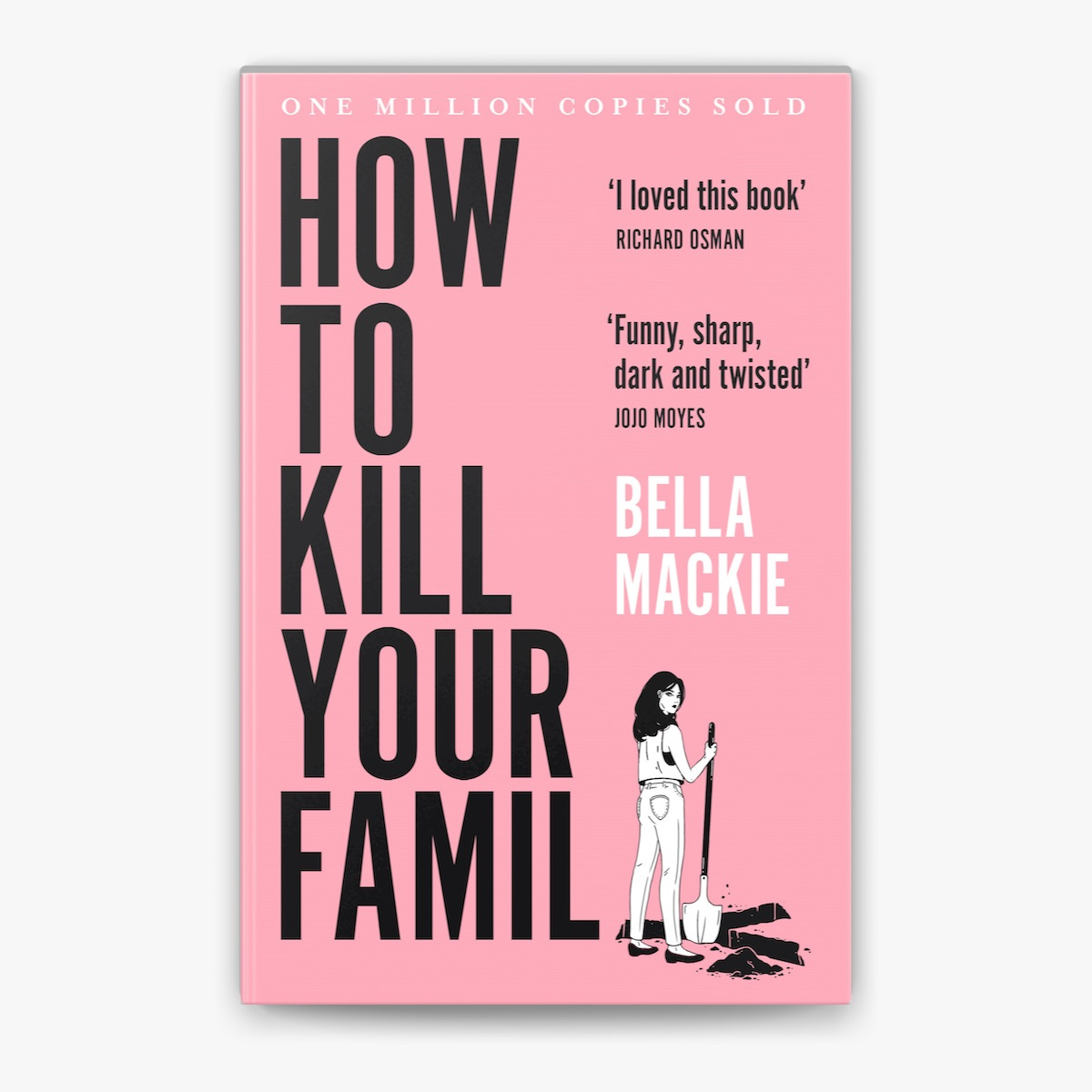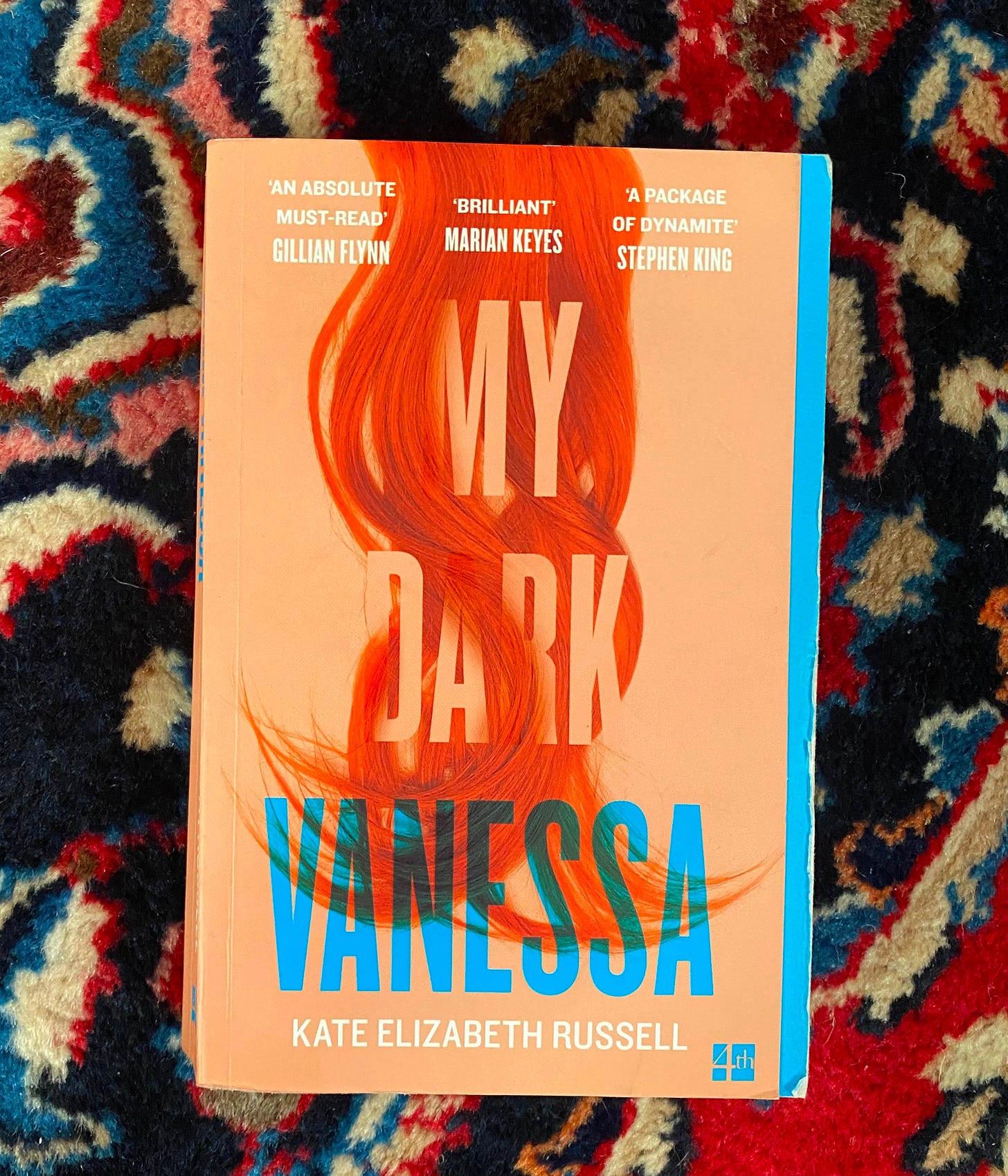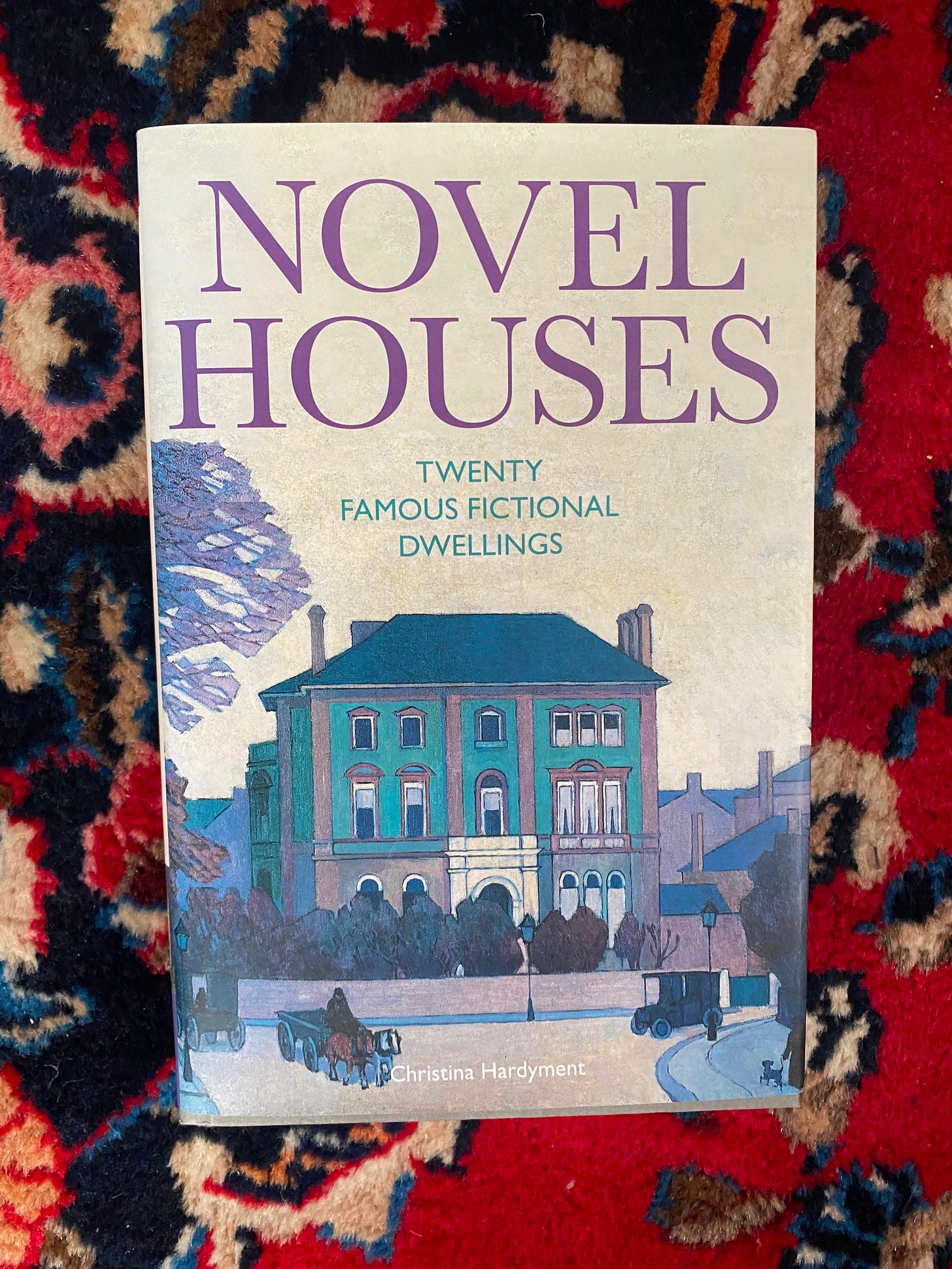It's going to be a bookish substack this week.
I was a bit flummoxed about what to write about. I wanted to scribble about the news story that has taken up all the oxygen in my brain - the CEO assassination, the unlikely alleged perpetrator and the frankly fascinating disconnect between how the media is reporting the story and the public reaction (hint: said public really doesn't like the corrupt health insurance system in the US and it has been a strange moment of unity in an increasingly popularised country). But I've decided instead to simply link you to the best thing, in my opinion, said on the whole episode which happened to be uttered by comedian, and possessor of the best Boston accent, Bill Burr.
Then I read Sophia Money-Coutts's fabulous substack this week where she details her adoration of her new vacuum. I thought I could likewise wax lyrical about the dehumidifier I have bought and promptly fallen in love with but on reflection, I decided not to put you guys through that.
Then I thought I could tell you about Wicked and how much I loved it and how I burst into tears at the ending but my heart just wasn't in it (although, it is a great movie, I suspect I might sneak off to see it again during the dead days and I highly recommend going to see it in the cinema - it's the kind of film that needs the big screen).
Nothing was really sticking. So instead, on something of a reading jag, I'm going to tell you about the books I've been reading lately...
Luster by Raven Leilani
I thought I was going to love this. It has received praise from all the right people - Zadie Smith called it "taut, shap, funny... brutal and brilliant" (though she was also Leilani's tutor at NYU) - but I just could not get on with it. In fact, I abandoned it 30 pages before the end because I found it so frustrating.
The novel is narrated by Edie, a young black woman making a pittance in publishing and barely scraping by in New York, an artist who can't bring herself to paint and instead has ill advised affairs with seriously unsuitable men.
The story (if you can call it that...) centres around her affair with Eric, a comfortably off white man, who works as some sort of curator, lives with his wife and adopted black daughter in a nice house in the New Jersey suburbs. I could not for the life of me see what Edie saw in Eric who seems completely mediocre (and that's a generous assessment) though I suppose that fits with Edie's disastrous taste.
On the plus side, Leilani writes sex brilliantly - or rather, she writes disappointing sex brilliantly, all the sad, fussy admin of sex and modern dating brilliantly.
"And then the worst part of meeting a man in broad daylight, the part where you see him seeing you, deciding in this split second whether any future cunnilingus will be enthusiastic or perfunctory."
"Based on his liberal use of the semicolon, I just assumed this date would go well."
The book hinges on Edie losing her job and therefore her mice-infested apartment in Brooklyn and somehow SOMEHOW Eric's wife Rebecca invites her to stay in their home while she gets herself on her feet. It's here that the book lost me. Rebecca knows about the affair, isn't happy about it, appears to foster no goodwill towards Edie and yet AND YET we are meant to believe she throws open her doors to her husband's mistress?!
A major plot point this wobbly made me lose faith in the book. Nothing much happens. Edie is kind to the adopted daughter and makes her feel a little more at ease in a predominantly white suburb. Edie starts to paint. She keeps sleeping with pathetic Eric. That is pretty much all that happens in this book.
So no, this isn't on my recommendations, although Leilani is a fiercely good writer. Her sentences are spiky and beautiful (although one does feel sometimes she is enjoying her verbal prowess a little too much at the expense of the reader) and she is so funny. "He may be the only man in recent memory to make me come, but he is not even on Twitter," made me howl with laughter.
She is particularly brilliant at describing Edie's poverty.
"The salmon smell is gone, but my roommate is on the couch clipping her toenails in her terrifying vitamin C sheet mask and up until this point I have sufficiently hidden the extent of my poverty."
There's real rage in this book at Edie's precarious economic position - "After the first two rides, I am enjoying myself, and not just because dying means I won't have to pay my student loans" - compared to mediocre Eric and his family. It's something I've been thinking about a lot - the economic chasms between generations strike me as particularly yawning right now.
TLDR: she’s a fierce writer but the plot was way too implausible and after a really enjoyable kick-off, the book spluttered out for me
How To Kill Your Family by Bella Mackie
For a time, this pale pink paperback (great cover, props to the Harper Collins art team) was truly ubiquitous. I recall mischievous booksellers had great fun placing it next to Prince Harry’s memoir Spare in book displays.
Well, I finally read it and what an absolute cracker of a book. Bella Mackie (daughter of Guardian editor Alan Rusbridger) really pulled it off with this smart retelling of Kind Hearts and Coronets.
The main character is Grace whose mother had a fling with a ghoulish multi-millionaire (possible billionaire?) called Simon Artemis - quite hilariously obviously based on Topshop mogul Philip Green - who then abandons them both without so much as a penny.
Grace devotes her life to a murderous plan: assassinating every member of the Artemis family in increasingly inventive and creative ways to seek revenge on her errant father.
It is a dark romp and so funny - I chortled in public while reading it. Grace is a superb character. She is quite obviously a psychopath and yet you can’t help rooting for her as she sets out to annihilate a family that you doubt anyone will miss. I particularly enjoyed the way she dispatched Janine and weird creepy uncle Lee.
But I had a major issue with the ending of this book! Mackie introduced a major character two chapters away from the end that totally changed the expected outcome of the novel in a way that felt nauseatingly unfair for the narrator, Grace. I’m conflicted - in a way it was a master stroke to show just how rigged the system is against someone like Grace but I also felt cheated to have the rug pulled out from underneath me after I invested 300 odd pages rooting for Grace.
On a side note, this would be a great book to take home for the holidays. If you are at all nervous about returning home for the festive season (who the hell isn't?), worried about family rows and tensions and simmering resentments and all the rest of that fun stuff, a book like this would be a great thing to tuck your nose into and escape if things get tricky.
TLDR: Addictive novel narrated by a psychopathic serial killer on a mission to eradicate her entire family - perfect book if you’re in a reading rut.
My Dark Vanessa by Kate Elizabeth Russell
Oh God, this book. I don't know. It's brilliant, yes, but it's also ghastly and left me thinking: was this a book I actually wanted to read?
The story is narrated by Vanessa who has what she calls a love affair with a teacher at her boarding school which begins - and is consummated - when she is just 15 years old and he is 42. The book unpacks just what happened and is a really detailed account of what it is like to be groomed by a predator. You learn how this relationship - again, words are so tricky here, it was a "relationship" but it was also abuse - has shaped Vanessa and affected her life (her education, her relationships, her career, her coping mechanisms) for years afterwards.
The brilliance of the book is that you see what happened through so many prisms. You see how the ghastly Mr Strane settled on Vanessa because she was a lonely 15-year-old, you see how his attention was intoxicating, you see how Vanessa truly believed this was a love story, you see how she revelled in what she thought was her own power over him and, in the modern day, you see the "me too" response to him - the novel opens with another woman accusing him of abusing her while she was at the same school.
This book is not for the faint of heart. There were moments while reading it when I realised I was scowling. Strane is such a creep and Russell presents him as such - not the romantic hero that Vanessa paints him for much of the book, but a middle aged man with a beer belly manipulating and gaslighting a young girl who was in his care, a despicably selfish man who covers his tracks as he does so. At times, I wanted to climb inside the book and screech at Vanessa, "The guy is a fucking paedo".
As I was reading the novel, I recall thinking distinctly: I don't want to read about some perverted older man grooming a young girl - and yet I also couldn't stop reading it. On the blurb, two magazines called it "addictively disturbing" and "as gripping as any thriller". It really was. I raced through the book even though, at times, I really didn't want to.
After I finished it, I felt kind of gross and thought: what kind of a subject matter is that for a book? And yet, immediately the response came: there have been a clutch of bloody brilliant books about something so utterly depressing. Obviously Lolita is the OG - and Vanessa, a bookish girl, constantly refers to it. And I did love Lolita which is a stunningly written, at times weirdly funny, novel. Then there's Notes On A Scandal by Zoe Heller - which switches up the sexes so it's a female teacher this time preying on a 15-year-old boy pupil (though the book asks if she is the only predator in the situation). I also loved Putney by Sofka Zinovieff which is a "Lolita answers back in the age of Me Too" kind of book, about a bohemian woman looking back on a relationship she had when she was technically a child with a family friend and realising it wasn't the above board "learning experience" she had always imagined it to be.
So, at the end of this book, I was impressed by Russell's craft and just what it must have taken to write this novel (she spent 18 years writing it and has said that it was informed by her own experiences). But I was left feeling uneasy, a little prurient, like I had peeked at something I shouldn't have. And I don't know how else to put it.
TLDR: Disturbing story about a teacher-pupil abusive relationship and how that plays out in the child-now-a-grown-up's life - difficult to read but strangely addictive
Novel Houses - Twenty Famous Fictional Dwellings by Christina Hardyment
Ok, this book is a nice little palette cleanser. It was a present from a dear friend (shout out to sweet Sarah) when I moved into my flat and it is such a good housewarming present if you have any bookish friends moving house.
Hardyment takes 20 famous houses from literature - Jane Austen's Mansfield Park, Manderley from Rebecca, the party palace in The Great Gatsby, for example - and spends a chapter looking at each real life counterpart that inspired the home in the book, how those homes affected the authors and more. The book is also a fabulous object in its own right - a gorgeous typeface with illustrations printed on paper that feels thick and creamy and expensive.
It is a beautiful book to page through every now and again and read in little chunks in idle moments. As I said, a great book to give as a present - or to treat yourself to.
That's it from me, for now, guys. I hope you have a lovely Sunday wherever you are, happy reading, and see you soon x









I loved Bella Mackie's Jog On: honest, wise, funny and generous (obviously not so much that I followed her advice, but still).
Funny you mention dehumidifier — I was Googling them yesterday, thinking of buying one for my home. So thrillingly domestic, I know! 😄 Also, I totally get the what-should-I-write-next dilemma: should I go for something original and deep (but energy-draining) or opt for something lighter (and worrying it’ll fall flat). Book reviews are always a good idea, though — I can never decide what to read ... so this helps.